W. Shakespeare "Hamlet": description, characters, analysis of the work
Dramaturgy of the 16th-17th centuries was an integral and perhaps the most important part of the literature of that time. This type of literary creativity was the closest and most understandable to the broad masses, it was a spectacle that made it possible to convey to the viewer the feelings and thoughts of the author. One of the most prominent representatives of the dramaturgy of that time, who is read and re-read to our time, plays based on his works, analyzes philosophical concepts, is William Shakespeare.
The genius of the English poet, actor and playwright lies in the ability to show the realities of life, to penetrate into the soul of every viewer, to find in it a response to his philosophical statements through feelings familiar to every person. The theatrical action of that time took place on a platform in the middle of the square, the actors in the course of the play could go down to the “hall”. The viewer became, as it were, a participant in everything that was happening. Nowadays, such an effect of presence is unattainable even when using 3d technologies. All the more important in the theater was the word of the author, the language and style of the work. Shakespeare's talent is manifested in many respects in his linguistic manner of presenting the plot. Simple and somewhat ornate, it differs from the language of the streets, allowing the viewer to rise above everyday life, to stand for some time on a par with the characters of the play, people of the upper class. And the genius is confirmed by the fact that this has not lost its significance in later times - we get the opportunity to become for some time accomplices in the events of medieval Europe.
The pinnacle of Shakespeare's work was considered by many of his contemporaries, and subsequent generations after them, to be the tragedy "Hamlet - Prince of Denmark". This work of a recognized English classic has become one of the most significant for Russian literary thought. It is no coincidence that the tragedy of Hamlet has been translated into Russian more than forty times. Such interest is caused not only by the phenomenon of medieval dramaturgy and the literary talent of the author, which is undoubtedly. Hamlet is a work that reflects the "eternal image" of a seeker of truth, a philosopher of morality and a man who has stepped above his era. The galaxy of such people, which began with Hamlet and Don Quixote, continued in Russian literature with the images of "superfluous people" Onegin and Pechorin, and further in the works of Turgenev, Dobrolyubov, Dostoevsky. This line is native to the Russian seeking soul.
History of creation - Tragedy Hamlet in romanticism of the 17th century
Just as many of Shakespeare's works are based on short stories in the literature of the early Middle Ages, so the plot of the tragedy Hamlet was borrowed by him from the Icelandic chronicles of the 12th century. However, this plot is not something original for the "dark time". The theme of the struggle for power, regardless of moral standards, and the theme of revenge is present in many works of all time. Based on this, Shakespeare's romanticism created the image of a person protesting against the foundations of his time, looking for a way out of these shackles of conventions to the norms of pure morality, but who himself is a hostage to existing rules and laws. The crown prince, a romantic and a philosopher, who asks eternal questions of being and, at the same time, is forced to fight in reality in the way that was customary at that time - “he is not his own master, his birth is tied hand in hand” (act I, scene III ), and this causes him an internal protest.
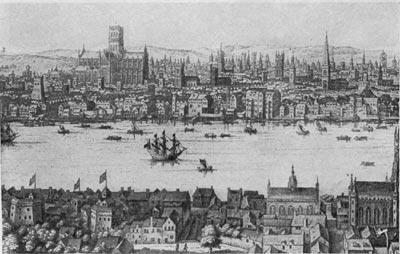
(Antique engraving - London, 17th century)
In the year of writing and staging the tragedy, England experienced a turning point in its feudal history (1601), therefore, in the play there is some gloom, a real or imaginary decline in the state - “Something has rotted in the Kingdom of Denmark” (act I, scene IV ). But we are more interested in the eternal questions “about good and evil, about fierce hatred and holy love”, which are so clearly and so ambiguously spelled out by the genius of Shakespeare. In full accordance with romanticism in art, the play contains heroes of pronounced moral categories, an obvious villain, a wonderful hero, there is a love line, but the author goes further. The romantic hero refuses to follow the canons of time in his revenge. One of the key figures of the tragedy - Polonius, does not appear to us in an unambiguous light. The theme of betrayal is considered in several storylines and is also offered to the viewer's judgment. From the obvious betrayal of the king and the infidelity of the memory of the late husband by the queen, to the trivial betrayal of the friends of the students, who are not averse to finding out the secrets from the prince for the mercy of the king.
Description of the tragedy (the plot of the tragedy and its main features)
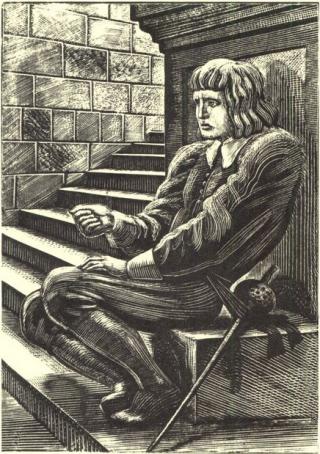
Ilsinore, castle of the Danish kings, night watch with Horatio, Hamlet's friend, meets the ghost of the deceased king. Horatio tells Hamlet about this meeting, and he decides to personally meet with his father's shadow. The ghost tells the Prince the gruesome story of his death. The king's death turns out to be a dastardly murder by his brother Claudius. After this meeting, a turning point occurs in Hamlet's mind. What was learned is superimposed on the fact of the unnecessarily fast wedding of the king's widow, Hamlet's mother, and the murderous brother. Hamlet is obsessed with the idea of revenge, but is in doubt. He must make sure of everything himself. Feigning madness, Hamlet observes everything. Polonius, adviser to the king and father of Hamlet's beloved, tries to explain to the king and queen such changes in the prince with rejected love. Before, he forbade his daughter Ophelia to accept Hamlet's courtship. These prohibitions destroy the idyll of love, further leading to depression and insanity of the girl. The king makes his attempts to find out the thoughts and plans of his stepson, he is tormented by doubts and his sin. The former student friends of Hamlet hired by him are with him inseparably, but to no avail. The shock of what he learned makes Hamlet think even more about the meaning of life, about such categories as freedom and morality, about the eternal question of the immortality of the soul, the frailty of being.
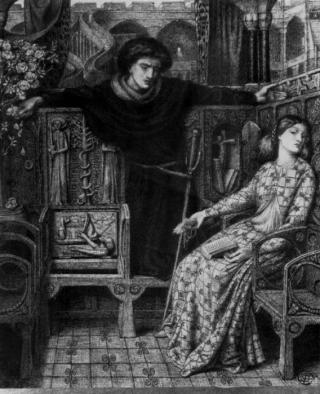
Meanwhile, a troupe of wandering actors appears in Ilsinore, and Hamlet persuades them to insert several lines into the theatrical action, exposing the king in fratricide. In the course of the performance, Claudius gives himself away with confusion, Hamlet's doubts about his guilt are dispelled. He tries to talk to his mother, to throw accusations in her face, but the ghost that appears forbids him to take revenge on his mother. A tragic accident exacerbates the tension in the royal chambers - Hamlet kills Polonius, who hid behind the curtains out of curiosity during this conversation, mistaking him for Claudius. Hamlet is sent to England to cover up these unfortunate accidents. Spy friends are sent with him. Claudius hands them a letter for the King of England asking him to execute the prince. Hamlet, who managed to accidentally read the letter, makes corrections in it. As a result, traitors are executed, and he returns to Denmark.
Laertes, the son of Polonius, also returns to Denmark, the tragic news of the death of his sister Ophelia as a result of her insanity because of love, as well as the murder of his father, pushes him to an alliance with Claudia in revenge. Claudius provokes a duel with swords between two young men, the blade of Laertes is deliberately poisoned. Not dwelling on this, Claudius poisons the wine as well, in order to make Hamlet drunk in case of victory. During the duel, Hamlet is wounded by a poisoned blade, but finds an understanding with Laertes. The duel continues, during which the opponents exchange swords, now Laertes is wounded by a poisoned sword. Hamlet's mother, Queen Gertrude, cannot stand the tension of the duel and drinks poisoned wine for her son's victory. Claudius is also killed, only Horace, the only true friend of Hamlet, remains alive. The troops of the Norwegian prince enter the capital of Denmark, who occupies the Danish throne.
main characters
As can be seen from the entire development of the plot, the theme of revenge fades into the background before the moral quest of the protagonist. The accomplishment of revenge for him is impossible in the expression, as is customary in that society. Even having convinced himself of his uncle's guilt, he does not become his executioner, but only an accuser. Unlike him, Laertes makes a deal with the king, for him revenge is above all, he follows the traditions of his time. The love line in the tragedy is only an additional means to show the moral images of that time, to set off the spiritual searches of Hamlet. The main characters of the play are Prince Hamlet and the king's adviser Polonius. It is in the moral foundations of these two people that the conflict of time is expressed. Not the conflict of good and evil, but the difference in the moral levels of two positive characters is the main line of the play, brilliantly shown by Shakespeare.
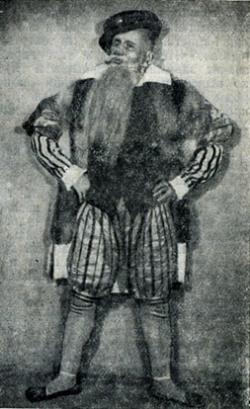
A smart, devoted and honest servant to the king and the fatherland, a caring father and a respected citizen of his country. He is sincerely trying to help the king understand Hamlet, he is sincerely trying to understand Hamlet himself. His moral principles at the level of that time are impeccable. Sending his son to study in France, he instructs him on the rules of conduct, which today can be given without changes, they are so wise and universal for any time. Worried about his daughter's moral character, he exhorts her to refuse Hamlet's courtship, explaining the class difference between them and not excluding the possibility of the prince's frivolous attitude towards the girl. At the same time, according to his moral views corresponding to that time, there is nothing prejudicial in such frivolity on the part of the young man. With his distrust of the prince and the will of his father, he destroys their love. For the same reasons, he does not trust his own son either, sending a servant to him as a spy. The plan for observing him is simple - to find acquaintances and, slightly slandering his son, lure out the frank truth about his behavior away from home. To eavesdrop on the conversation of an angry son and mother in the royal chambers is also not something wrong for him. With all his actions and thoughts, Polonius appears to be an intelligent and kind person, even in the madness of Hamlet, he sees his rational thoughts and gives them their due. But he is a typical representative of a society that puts so much pressure on Hamlet with its deceit and duplicity. And this is a tragedy that is understandable not only in modern society, but also in the London public of the early 17th century. Such duplicity is protested by its presence in the modern world.
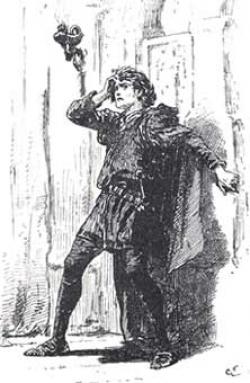
A hero with a strong spirit and an outstanding mind, searching and doubting, having become one step higher than the whole society in his morality. He is able to look at himself from the outside, he is able to analyze those around him and analyze his thoughts and actions. But he is also a product of that era and that binds him. Traditions and society impose a certain stereotype of behavior on him, which he can no longer accept. On the basis of the plot about revenge, the whole tragedy of the situation is shown when a young man sees evil not just in one vile act, but in the whole society in which such acts are justified. This young man calls himself to live in accordance with the highest morality, responsibility for all his actions. The tragedy of the family only makes him think more about moral values. Such a thinking person cannot but raise universal philosophical questions for himself. The famous monologue "To be or not to be" is only the pinnacle of such reasoning, which is woven into all his dialogues with friends and enemies, in conversations with random people. But the imperfection of society and the environment still pushes for impulsive, often unjustified actions, which are then hard experienced by him and ultimately lead to death. After all, the guilt in the death of Ophelia and the accidental mistake in the murder of Polonius and the inability to understand the grief of Laertes oppress him and shackle him with a chain.
Laertes, Ophelia, Claudius, Gertrude, Horatio
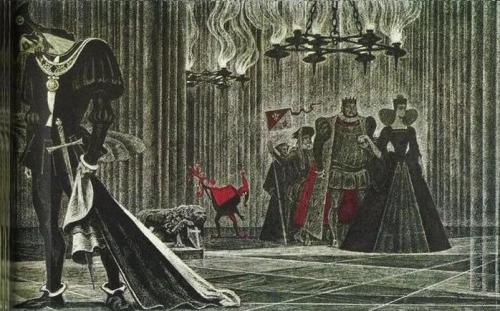
All these persons are introduced into the plot as Hamlet's entourage and characterize ordinary society, positive and correct in the understanding of that time. Even considering them from a modern point of view, one can recognize their actions as logical and consistent. The struggle for power and adultery, revenge for the murdered father and the first girlish love, enmity with neighboring states and obtaining land as a result of jousting tournaments. And only Hamlet stands head and shoulders above this society, bogged down to the waist in the tribal traditions of succession to the throne. Three friends of Hamlet - Horatio, Rosencrantz and Guildenstern, are representatives of the nobility, courtiers. For two of them, spying on a friend is not something wrong, and only one remains a faithful listener and interlocutor, a smart adviser. An interlocutor, but nothing more. Before his fate, society and the whole kingdom, Hamlet is left alone.
Analysis - the idea of the tragedy of the prince of Denmark Hamlet
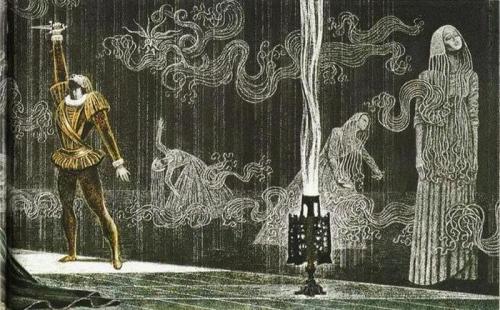
The main idea of Shakespeare was the desire to show psychological portraits of contemporaries based on the feudalism of the "dark times", a new generation growing up in society that can change the world for the better. Competent, seeking and freedom-loving. It is no coincidence that in the play Denmark is called a prison, which, according to the author, was the whole society of that time. But the genius of Shakespeare was expressed in the ability to describe everything in semitones, without sliding into the grotesque. Most of the characters are positive and respected people according to the canons of that time, they reason quite sensibly and fairly.
Hamlet is shown as a person prone to introspection, spiritually strong, but still bound by conventions. The inability to act, the inability, makes him related to the "superfluous people" of Russian literature. But it carries a charge of moral purity and the desire of society for the better. The genius of this work lies in the fact that all these issues are relevant in the modern world, in all countries and on all continents, regardless of the political system. And the language and stanza of the English playwright captivate with their perfection and originality, make you re-read the works several times, turn to performances, listen to performances, look for something new, hidden in the mists of time.
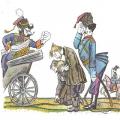 “Lefty” - a summary of the work N
“Lefty” - a summary of the work N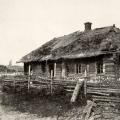 Turgenev, "Biryuk": a summary
Turgenev, "Biryuk": a summary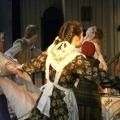 Comedy A.N. Ostrovsky "Poverty is not a vice": a summary of the work
Comedy A.N. Ostrovsky "Poverty is not a vice": a summary of the work